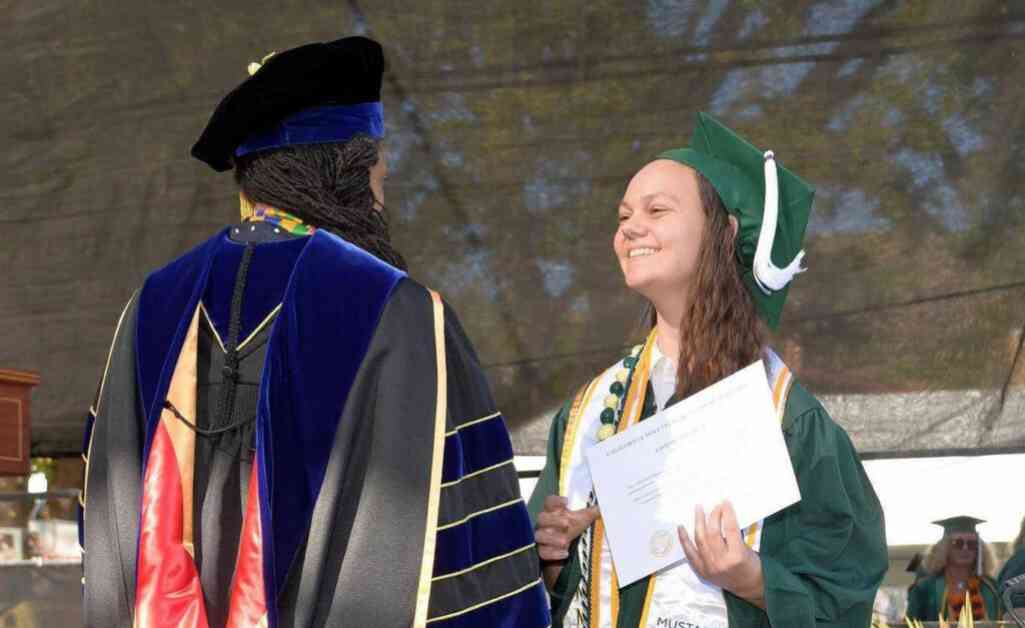Planning for Success: Graduating in Three Years
As Ashley Bolter walked across the stage at Cal Poly San Luis Obispo’s graduation ceremony in June 2024, she reflected on her journey as a student who chose to graduate in three years instead of the traditional four. Bolter’s decision to expedite her college experience was not one taken lightly, but rather a strategic choice that allowed her to maximize her time, resources, and opportunities.
Arriving at Cal Poly San Luis Obispo, Bolter initially anticipated spending four years on campus, forming lasting friendships and savoring the full college experience. However, as she sat in her freshman dorm room, meticulously planning out her course schedule, she realized that she had the potential to graduate early if she stayed on track. Bolter’s love for learning and her proactive approach to academics set her on a path towards accelerated graduation.
Early Preparation: A Foundation for Success
Bolter’s decision to graduate early was not a spontaneous one but rather the result of careful planning and preparation that began long before her college years. As a high school student, she seized the opportunity to enroll in Advanced Placement and dual enrollment classes, accruing extra units that would ultimately expedite her college timeline. By strategically leveraging her academic background, Bolter entered college with a head start, paving the way for an accelerated path to graduation.
While the prospect of graduating early held undeniable appeal, Bolter, like many first-generation college students, faced financial constraints that necessitated a full-time course load. Balancing the desire for academic enrichment with practical considerations, she opted to prioritize efficiency and cost-effectiveness by graduating a year ahead of schedule. This decision exemplifies the importance of adaptability and resourcefulness in navigating the complexities of higher education.
Maximizing Opportunities: A Balanced Approach
Despite the accelerated pace of her academic journey, Bolter did not compromise on the richness of her college experience. Balancing a rigorous course load with extracurricular activities, part-time work, internships, and social engagements, she exemplified the art of time management and prioritization. By meticulously planning her schedule each quarter and anticipating contingencies, Bolter was able to pursue her diverse interests while staying on track towards graduation.
The key to Bolter’s success lay in her proactive mindset and organizational skills, which enabled her to juggle multiple responsibilities without sacrificing quality or depth. Whether participating in marching band, writing for the school newspaper, or gaining real-world experience through internships, she approached each endeavor with dedication and purpose. Bolter’s ability to maximize opportunities and cultivate a well-rounded college experience underscores the value of holistic education beyond the confines of the classroom.
Empowering Student Choice: Redefining College Timelines
As Bolter reflects on her unconventional path to graduation, she challenges the prevailing notion of a rigid four-year timeline for completing a degree. In an era where only 49% of undergraduate students graduate within four years, the traditional model of higher education is being reexamined and redefined. Bolter’s advocacy for student autonomy and flexibility in determining their educational timeline underscores the importance of personalized approaches to learning.
By acknowledging that students may have varying needs, goals, and circumstances that impact their college journey, Bolter advocates for a more inclusive and adaptable educational system. Whether completing a degree in three years, four years, or beyond, students should be empowered to pursue their academic aspirations at a pace that aligns with their individual circumstances. Bolter’s call for a student-centric approach to higher education reflects a broader shift towards prioritizing student choice and agency in shaping their educational experiences.
In conclusion, Ashley Bolter’s experience of graduating in three years serves as a testament to the power of strategic planning, proactive decision-making, and a holistic approach to education. By embracing opportunities for growth, balancing academic rigor with extracurricular pursuits, and advocating for student autonomy, Bolter exemplifies the transformative potential of a personalized and purpose-driven college experience. As students navigate the complexities of higher education, Bolter’s story offers valuable insights and inspiration for reimagining traditional timelines and embracing individualized pathways to success.
